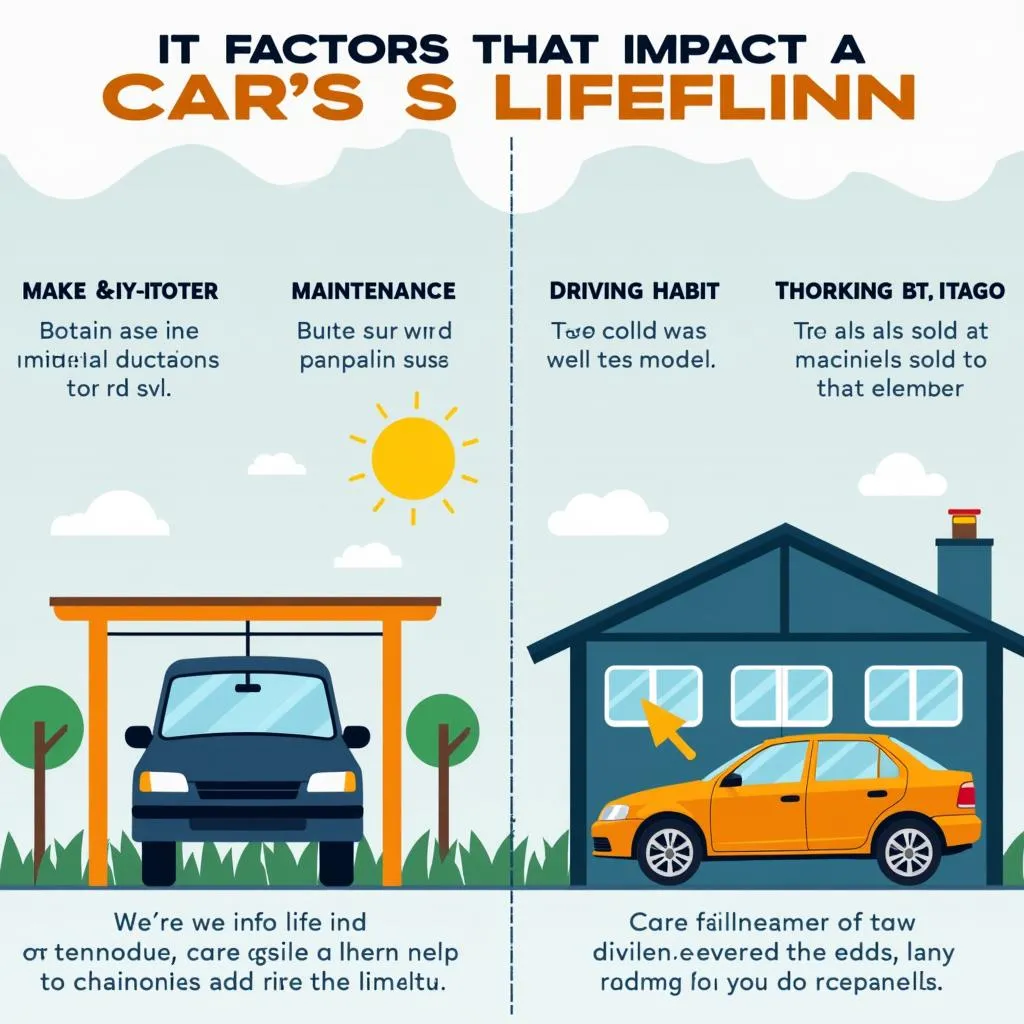Imagine this: you’re cruising down the Pacific Coast Highway in your sleek convertible, the California sun warm on your face. You glance at the odometer: 150,000 miles. A wave of pride washes over you – your trusty steed has served you well. But a niggling question arises: how much longer can you expect this joyride to last?
This question plagues countless car owners. It’s a multifaceted inquiry with no single, definitive answer. As an expert in automotive repair, particularly specializing in European car electrical systems, I’m here to break down the factors that influence a car’s lifespan and provide you with the knowledge to maximize your vehicle’s longevity.
The Meaning Behind the Question: More Than Just Mileage
“How long should a car last?” isn’t merely about a numerical figure. It delves into economics, sentimentality, and even a touch of environmental consciousness.
From an automotive repair expert’s perspective, it’s about understanding the wear and tear on components, anticipating potential failures, and advising on preventive maintenance. For the car enthusiast, it might signify a desire to push their beloved machine to its limits. Economically, it’s about maximizing value for money and planning for future expenses.
Decoding the Lifespan: A Multifaceted Equation
There’s no magic number, but the average lifespan of a car today is around 150,000 to 200,000 miles. However, this is a ballpark figure influenced by several variables:
Make and Model: The DNA of Durability
Just like humans, cars have inherent strengths and weaknesses based on their “genes” – make and model. A robust Toyota Land Cruiser, known for its off-road prowess, will likely outlast a compact city car in terms of sheer ruggedness.
Maintenance: The Fountain of Youth
Regular maintenance is the elixir of life for your car. Imagine skipping oil changes, neglecting brake fluid flushes, and ignoring those ominous dashboard warning lights. Your car would age faster than a banana in a time-lapse video!
Driving Habits: The Wear and Tear Factor
Are you a gentle cruiser or a speed demon? Aggressive driving, frequent short trips, and harsh braking can significantly shorten your car’s lifespan. It’s like comparing a marathon runner to a sprinter – one endures, the other burns bright but short.
Environmental Factors: The Unseen Enemy
Extreme temperatures, salty coastal air, and rough terrain can take a toll on your car. Think of it like exposing your skin to the elements without protection – premature aging is inevitable.
 Factors Affecting Car Lifespan
Factors Affecting Car Lifespan
Signs of Aging: When Your Car Starts Whispering
Your car often communicates its well-being, if you know how to listen. Here are some telltale signs of an aging vehicle:
- Increased Repair Frequency: Frequent trips to the mechanic are like doctor’s appointments – a sign that things might be going south.
- Decreased Fuel Efficiency: If your car suddenly guzzles gas like a thirsty camel, it could indicate engine wear or other inefficiencies.
- Strange Noises and Vibrations: Unexplained rattles, squeaks, and vibrations are often your car’s way of saying, “Hey, pay attention to me!”
Extending the Journey: Tips for a Longer Drive
While you can’t turn back the odometer, you can certainly maximize your car’s remaining miles:
- Stick to the Maintenance Schedule: Religiously follow your car’s recommended maintenance schedule. It’s like taking your vitamins – preventative measures go a long way.
- Address Issues Promptly: Don’t ignore those warning lights! Addressing problems early can prevent minor issues from snowballing into major expenses.
- Drive Sensibly: Smooth acceleration, gentle braking, and maintaining a steady speed can significantly reduce wear and tear.
Beyond the Horizon: FAQs and Further Exploration
Q: Is it worth repairing an old car?
A: This depends on various factors like the repair cost, the car’s overall condition, and its sentimental value. Sometimes, saying goodbye is the more practical option.
Q: How do I know when it’s time to replace my car?
A: Consider factors like increasing repair costs, declining reliability, and safety concerns. If the cons outweigh the pros, it might be time for an upgrade.
Q: Can I increase my car’s resale value?
A: Absolutely! Regular maintenance, a clean history report, and even minor cosmetic touch-ups can boost your car’s appeal to potential buyers.
 Selling a Used Car
Selling a Used Car
For more insights into car maintenance and financing, check out these resources:
The Open Road Awaits
Ultimately, the lifespan of your car is a journey, not a destination. By understanding the factors at play and embracing proactive maintenance, you can enjoy many miles of happy motoring. Remember, a well-maintained car isn’t just about longevity; it’s about safety, reliability, and peace of mind.
Need help diagnosing a potential issue or want advice on extending your car’s lifespan? Our team of expert automotive technicians is just a message away. Contact us on WhatsApp at +84767531508 for 24/7 support and expert advice.


